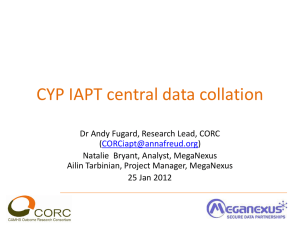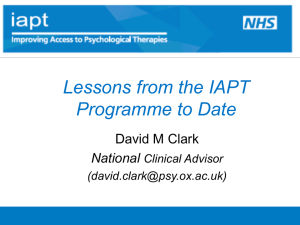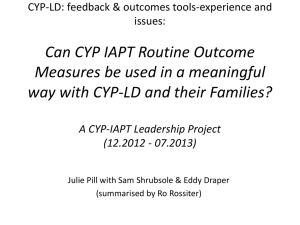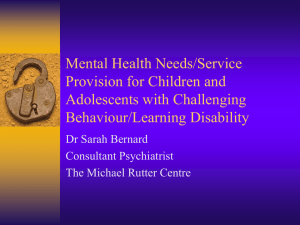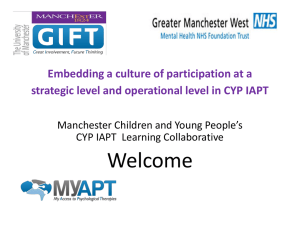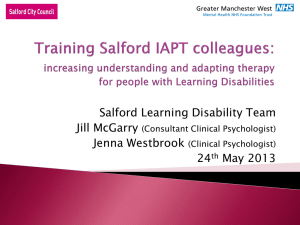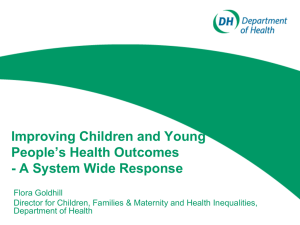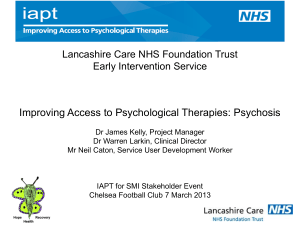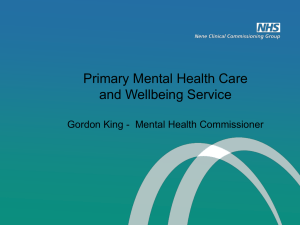New Partmerships March 2012
advertisement
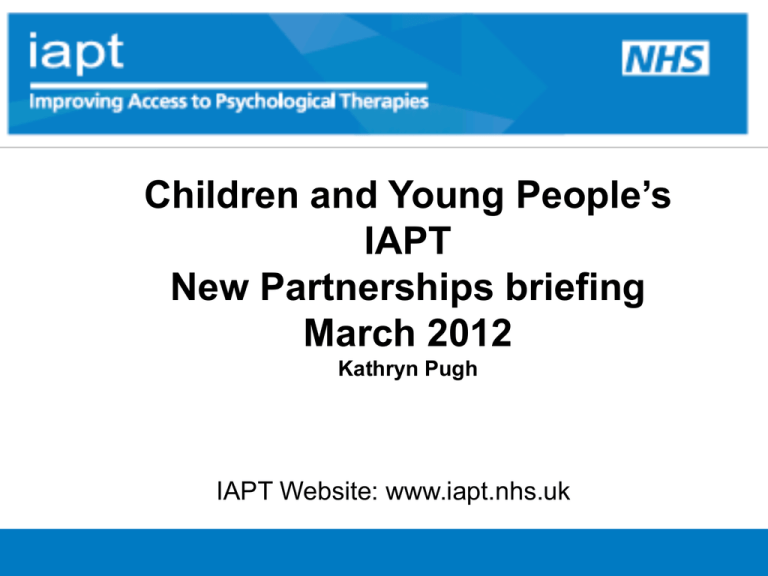
Children and Young People’s IAPT New Partnerships briefing March 2012 Kathryn Pugh IAPT Website: www.iapt.nhs.uk Plan for Today • Context setting • The Children and Young People’s IAPT Project • The bidding process Context: Policy New Mental Health Strategy, 2011 - Life course approach: Quality Driven - Implementation Plan being prepared NHS and Social Care Bill, 2011 - Outcomes frameworks, NHS, Social Care, Public Health Commissioning developments – QIPP, CQUIN – CAMHS PbR Data & IT, Choice - Data to support quality and choice New investment announced does not impact on your application • Existing package through existing collaboratives • Increase in geographical reach of collaboratives • Introduction of new therapies – IPT and SFT • E packages - universal staff - counsellors -Computerised CBT for CYP Context: Current Services • Lack of systematic evidence of – what services deliver – and what is missing is major weakness Project assumptions • CYP IAPT will learn from Adult IAPT but will be specific to the needs of children and families • The budget is still modest and will be available until the next Comprehensive Spending Review. • Participation in the CYP IAPT project will be offered to existing CAMHS - not necessarily exclusively provided by the NHS. Transforming CAMHS through IAPT • Working in partnership with children and young people • Embed EBP by service development • Building on established local relationships • Training CAMHS staff in RCT validated techniques • Enhance supervision and monitoring of outcomes • Maximise the value of investment • Deliver quick and visible change • Optimise local flexibility 2011-2012 • Year one – CBT for anxiety and depression & parenting training for conduct disorder • Training for supervisors • Training for therapists – Targeted/specialist (T2/3) – Training in the use of outcomes information – Training programme to support service managers • Excluded from year one – Training of staff at universal and early targeted levels – NICE recommended modalities other than CBT and parenting training CYP IAPT Learning Collaboratives • Core group of providers delivering high quality training to a wide area • Working in collaboration to maximise chance of delivering service change • Local CAMHS partnerships to contribute to designing and delivering training – – – – – – technical input clinical supervision involvement of service users peer evaluation oversight skills exchange schemes • Encouraging HEIs to invest in a long term response to training CAMHS-IAPT Learning Collaboratives Partnership 1 NHS CAMHS VS Commissioners Partnership 3 NHS CAMHS VS HEI •Assure quality •Organise training •Deliver content (in partnership) Partnership 2 NHS CAMHS VS Commissioners Commissioners Building a Lasting Collaborative Mentorship Partnership 4 NHS CAMHS Partnership 1 NHS CAMHS Peer Support VS Partnership 5 VS Commissioners NHS CAMHS VS Commissioners Peer Support Partnership 3 NHS CAMHS HEI •Assure quality •Organise training •Deliver content (in partnership) VS Commissioners Mentorship Partnership 2 NHS CAMHS Commissioners Mentorship Partnership 6 NHS CAMHS VS Commissioners Peer Support Commissioners VS Year one collaboratives Reading •Ox and Bucks •Wilts, Bath and NE Somerset •Gloucs •Swindon •Bournemouth, Dorset and Poole UCL & KCL •Lambeth & Southwark •Herts •Sussex •Westminster •Haringey •Cambridge •Wandsworth •Greenwich Salford •Derby •Manchester and Salford •Pennine North •Pennine South •Barnsley What does our offer include? • Training and ‘backfill’ for staff – Trainees – Supervisors – Managers/leaders • For partnerships: funding for service development, IT infrastructure, participation, accreditation • Creating change agents within CAMHS • Funding for a further year for data capture across the service Principle Behind the Core Offer: Rigorous Adherence to Protocol •National curriculum to define teaching content •Well-defined competencies to evaluate individual trainees at selection and at the end of training •Strong front-ending of supervisor training •HEIs to ensure competence of practice and implementation •Unwavering emphasis on outcomes monitoring and outcomes-informed practice •Learning from the evidence at individual therapist, speciality and service organisation levels Principle Behind the Core Offer: Flexibility •Allowing variation in structures for the construction of learning collaboratives that effectively meet IAPT priorities given local organisational constraints •Creating (modularised) training programme structures that optimally match skills needs •Encouraging collaboration between HEIs and partnerships and between partnerships to make optimal use of local knowledge and skills •Within Collaborative Clusters organisation of the funding for the programme (including backfill and infrastructure) The funding formula - each collaborative has a package based on Therapist to supervisor ratio 5:1 Staff & Fees -Therapist backfill (per therapist) -Supervisor and leadership backfill -Therapist training -Supervisor training Infrastructure -Service manager/lead training -IT -Participation -Service development e.g. self referral -Accreditation of services £30K £60K £12K £ 5K £100K £ 5K £40K £10K £35K £10K Changes to the formula since year one If you apply for a supervisor and have less than 5 trainees, formula is Supervisor training + backfill for 4months+ funding to supervise the number of trainees applied for at £8K per trainee Eg – partnership applies for 4 therapists, supervisor funding is 5K +20K plus (4x8K) = £57K Using the funding • Can be used flexibly – but we do ask how you plan to use the money to meet the commitments you sign up to • For example – Agreeing extra supervision or support from HEI – Setting up new systems e.g. telephone triage Criteria to Evaluate Bids: Partnerships • Vision for enhancing service by embedding EBP therapy and commitment to training • Markers of stability (e.g. funding TMHS) • Vision and commitment to outcomes monitoring • Vision to improve access to therapy including self referral • Ensuring access and waiting times are sustained • Matching community aspirations • Existing ratio of need to current resources Routine Outcome Monitoring • Full details and resources are on the web – www.iapt.nhs.uk • Measures at assessment, session by session and at review/end • Embedding outcome monitoring – in the therapeutic relationship – in supervision – Across all practitioners not just IAPT trainees – Data information sessions 19 March 2012 The CYP-IAPT Implementation Feedback Process • • • • • Develop a Collaborative Partnership Adapt for Contexts & Culture Train Professionals Evaluate Effectiveness Evaluate Fidelity – Certification and Accreditation – video observation • Make Sustainable – Supervision and recertification Quality Assurance and Evaluation • Accreditation in development • Sites and Collaboratives to be evaluated using outcomes monitoring and CYP evaluations • We are intent on evaluation of the process as a whole Timeline for 2012-Phase One Febof 2012 End July rd April 23 2012 End of July June End of2012 July November 2012 End of July January 2013 End of July Advertise for phase one sites Completed applications to be submitted Select sites Supervisors and Service managers begin training Therapists begin training The Application Process • Application process – our interest is in commitment to transformation : sign up to the fixed aspects of the project and understanding how you will approach areas where method of delivery is not determined • Evaluation methodology and weighting is in the Offer • The size of the bids are not predetermined • Funding will flow via PCTs/CCGs Documents you will need to consider • National Curriculum - understand the nature of the training for your teams • Core offer – Sets out in detail our offer to you – Sets out the calculations sitting behind the funding package – Sets out what we are looking for in competitive bids Documents continued • Joining and existing collaborative Application Form • Requires senior level sign off – Word applications for all qualitative information – Excel workbook • One worksheet for each HEI/Training Provider • One worksheet for each local partnership • Financial macros calculate the funding package Lessons learned from year one • Make sure you fully understand the paperwork and what you are agreeing to do • Start having discussions now about Information Governance eg filming cases, data flowing to the centre • Sort out local governance – money will come to the PCT, how will it get to suppliers? • Discuss with clinical teams the routine outcome monitoring - don’t assume you will ‘make’ everyone do it After 23rd April • Bids are sent to SHA leads for comment – each SHA has been asked to nominate a lead/link for the project • Short listing by collaboratives and members of the Service Development Group who are not bidding • Interview appointments sent out for interviews • Interviews in June You are applying for • Existing CBT, parenting and Service development package • You will have the opportunity to train in the new therapies when we know how they will be delivered • www.iapt.nhs.uk • Kathryn.pugh@dh.gsi.gov.uk
